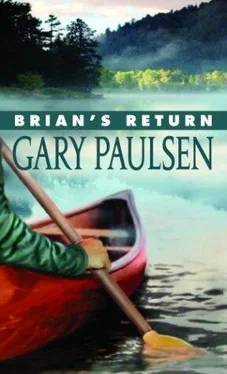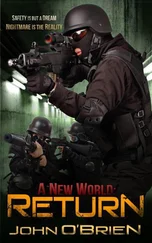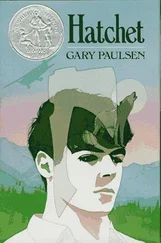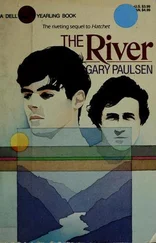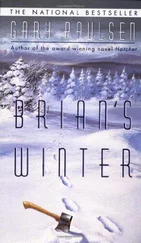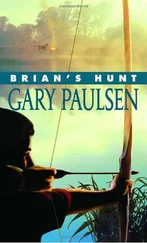Overhead the trees were filled with birds and they sang all at the same time. The sound blended into a kind of music and Brian found himself humming with it as he paddled.
Halfway through the first of the long, covered passageways he came upon a cow moose. She was well off to the side and had her head completely under water pulling at lily pad roots. As Brian came up on her, gliding silently, she raised her head suddenly and seemed to stare directly at him.
Brian had run into difficulties in the past with moose. He thought they were insane, and he’d been attacked by them twice. He laid the paddle down softly and took up his bow. He had kept one of the broadheads lying across the pack by the bow. Moving slowly, he fitted the arrow to the string so if need be he could grab the bow and get at least one arrow into the moose if she charged.
He passed not twenty feet from her but all she did was keep chewing on the root, water dripping in golden drops from her muzzle, breaking the surface like jewels. It was as though she hadn’t seen him— and perhaps she hadn’t. Moose, he had read, had terrible eyesight and she may have thought he was merely a log drifting by. Before he had passed by, she had put her head beneath the surface again, looking for more roots. Brian went back to studying beauty.
All that day he felt as if he were in a painting, a beautiful private diorama. He worked through a sheltered narrow lagoon and then out into the open to cross a small lake, then back under the canopy through the still water.
He had never had a day pass so quickly nor so beautifully and he nearly forgot that he had to find a camp and get some food before dark. He wasn’t sick of boiled fish and rice yet, so in the late afternoon he took time to move back along the lily pads and drop the hook over. He caught a large sunfish immediately — again, on a bare hook — and took three more small ones, dropping them all over the side using a short piece of nylon rope as a stringer, running the nylon through their gills and out their mouths.
He took his time looking for a campsite and picked one on a flat area five or six feet above the surface of the lake. It was a clearing about twenty yards across. There were many such clearings, probably all made by beaver cutting down the small trees years before, allowing the grass to take over. Brian pulled the canoe well up onto the grass and for no real reason tied a piece of line from the boat’s bow to a tree.
Later he would wonder at this bit of foresight. He had not done it the night before, and since this site was much higher from the water he wouldn’t have thought he’d need to secure the canoe here.
The storm hit in the middle of the night.
Dear Caleb: Nothing much to report today, unless you count shooting yourself in the leg with an arrow.
It was not that there was so much wind — certainly not as much as he’d been through before with the tornado — when he was first marooned in the wilderness and not that there was so much rain, although there was a goodly amount of it.
It was the combination of the two.
He had cooked dinner and eaten, boiled water for the next day’s canteen, pulled his packs up in a tree, set up the tent and arranged his sleeping bag and weapons. Then he’d sat by the fire and written to Caleb about the day in one of the books, using tiny writing so he wouldn’t waste the pages.
When he was done he put the book back in a plastic bag and crawled inside the tent to go to bed.
Two things he noted but didn’t pay attention to: One, the mosquitos and flies were not as bad as they’d been. Two, with darkness a heavy cloud layer had come up, causing a closeness in the air.
He had studied the map. It looked as if he’d gone more than twenty miles, which explained why he was tired. About eighty miles remained to reach Williams Lake, maybe four more days at his current rate. He fell asleep almost as soon as he lay down.
He was awakened by a new sound, a loud sound. Not thunder — it never did thunder or lighten — and not the trainlike roar of a tornado. This just started low, the hissing of rain driven against the tent. He listened for a moment, then snuggled back in his bag. He was in a good shelter, waterproof — let it rain.
Except that it kept coming and kept coming. It went from a moderate rain to a downpour and finally to an outright deluge. And with the rain came wind. Not violent, but enough to break off branches and push the rain still harder, and soon Brian found his bag wet as the rain came in under the tent. He lifted the flap to look out but it was far too dark to see anything.
And it rained harder. And harder. The wind pushed stronger and still stronger and at last the tent seemed to sigh. It collapsed around him and he started rolling across the grass toward the edge of the clearing.
Everything was upside down, crazy. He couldn’t find the entrance and about the time he thought he had it the tent dropped off the five-foot embankment and he rolled down to the lakeshore.
He landed in a heap and felt an intense, hot pain in his right leg at the upper thigh and reached down to feel an arrow shaft protruding from his leg.
Great, he thought. I’ve shot myself in the leg. He hadn’t, of course, but had rolled onto an arrow that had fallen out of the quiver just as the tent rolled off the embankment.
He couldn’t get his bearings but he knew where his thigh was and he grabbed the arrow and jerked the shaft out of his leg. There was an immediate surge of pain and he felt like passing out. He didn’t, but then he heard a strange whump-thump and something crashed down on his head. This time he did pass out.
He came to a few seconds later with a sore head, a sore leg and absolutely no idea in the world what was happening to him. He was still wrapped in the tent and his bag was in his face and his bow and arrows lay all around him and he seemed to be in water, almost swimming.
All right, he thought, take one thing at a time. Just one thing.
I poked my leg with an arrow.
There. Good. I pulled the arrow out. My leg still works. It must not have been a broadhead because it didn’t go in very deep. Good.
My tent collapsed. There. Another thing. I’m in the tent and it collapsed. I just have to find the front zipper and get out and climb up the bank. Easy now, easy.
Something hit me on the head. What? Something big that thunked. The canoe. The wind picked up the canoe and it hit me.
There. I’ve poked my leg, rolled down a bank and been hit in the head with the canoe.
All simple things. All fixable things.
He fumbled around and at last found the zipper at the front of the tent, opened it and slithered out into the mud on the lakeshore.
The rain was still coming down in sheets, the wind still hissing and slashing him with the water, but he had his bearings and it was not impossible to deal with things. He dragged the tent back up the embankment onto the grass, limping as the pain in his leg hit him. It was too dark to see much but he could make out the shape of the canoe lying upside down. It had moved a good ten feet from where he had left it and had he not tied it down loosely with the line it would have blown away across the lake.
He had forgotten the most important thing about living in the wilderness, the one thing he’d thought he would never forget — expect the unexpected. What you didn’t think would get you, would get you. Plan on the worst and be happy when it didn’t come.
But he had done one thing right: He had tied the canoe to a tree. He dragged the tent to the canoe, crawled underneath and lay on the tent the rest of the night, listening to the wind and rain, wincing now and then with the pain in his leg and feeling stupid.
Читать дальше
